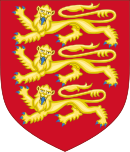| This article is part of a series on |
| Politics of the United Kingdom |
|---|
 |
|
|
| This article is part of a series within the Politics of the United Kingdom on the |
 |
|---|
In England, regional ministers were appointed from 2007 on a part-time basis as part of Her Majesty's Government. Each minister had other departmental responsibilities, as well as specific responsibilities for one of the English regions. Their stated role was "to provide a clear sense of strategic direction for the nine English regions and to help strengthen their links with central government."[1]
Following the 2010 general election, the Prime Minister's Spokesman was asked on 17 May 2010 if Regional Ministers had been scrapped. He said that the process of completing appointments to the Government was continuing, and that the Prime Minister, David Cameron, "had been very clear on the importance of devolution".[2] On 4 June 2010 the Evening Standard reported that the post of Minister for London had been scrapped.[3] No formal announcements were made in relation to regional ministers, but as of October 2010 no appointments had been made by the coalition government.
Since 2010, a number of similar roles have been created, including a Minister for Cities in 2011,[4] Minister for Portsmouth in 2014[5] and Minister for the Northern Powerhouse in May 2015.[6]
- ^ Regional Ministers at Government Offices webpage. Accessed 27 February 2010
- ^ Downing Street Morning Press Briefing, 17 May 2010. Accessed 18 May 2010
- ^ "Boost for Boris Johnson as David Cameron axes London minister", Evening Standard, 4 June 2010[dead link]
- ^ McCann, Kate (20 July 2011). "Greg Clark appointed minister for cities". The Guardian. Retrieved 8 May 2016.
- ^ "Minister for Portsmouth to be Michael Fallon". BBC News. 16 January 2014. Retrieved 8 May 2016.
- ^ "What is the Northern Powerhouse?". BBC News. 14 May 2015. Retrieved 8 May 2016.


